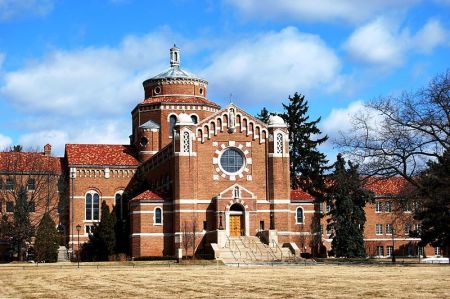13 Catholic sisters killed after coronavirus sweeps through Mich. convent ‘like wildfire’

An outbreak of the new coronavirus swept through a Michigan convent “like wildfire,” killing 13 of religious sisters who lived, prayed and worked together in a matter of weeks, a Global Sisters Report said Monday.
"I get chills thinking about that," Sr. Mary Andrew Budinski, the superior of the Presentation of the Blessed Virgin Mary convent in Livonia, where the women lived communally, said in the report. "The raw grief is yet to come, I think."
The Global Sisters Report, which is a nonprofit project of the National Catholic Reporter publishing company, said all of the women who died were members of the Congregation of the Sisters of St. Felix of Cantalice, or Felician Sisters. St. Felix was a Franciscan friar.
Between Good Friday on April 10 and May 10, 12 of the sisters died after battling the coronavirus. Then on June 27, one of 18 other sisters who initially survived the illness died from its effects to become the 13th fatality. Obituaries provided by Suzanne English, executive director for mission advancement for sisters to The New York Times, show that the women were all members of the Felician congregation for at least 50 years and ranged in age from 69 to 99.
In a statement to The Christian Post provided by English on Friday, Sr. Noel Marie Gabriel, CSSF, director of clinical health services for Our Lady of Hope Province, said more than half, 30, of the 57 Felician Sisters who were living at the Livonia convent prior to April were infected.
Some 44 sisters as well as five international students from other congregations studying at Madonna University, founded by the Felician Sisters, remain at the convent.
After so many deaths many of those who survived are facing a different reality that sometimes is challenging for their faith.
"The faith we share with sisters as they are dying, the prayers we share with sisters as they are dying: We missed all that," Sr. Joyce Marie Van de Vyver said in the Global Sisters Report. "It kind of shattered our faith life a little bit."
English told CP the sisters in Livonia have “very deep” ties to the community.
“In a square-mile block in Livonia, the sisters founded Madonna University, a Montessori School, St. Mary Child Care Center, Angela Hospice and Marywood Nursing Care Center, as well as the all-female Ladywood High School (1960-2018), so their collective impact on the community has been, and continues to be, very deep,” she said.
As the coronavirus began sweeping the U.S. in March, and people made adjustments to their lives, the convent started making changes, too, and the sisters who were very involved in public life as librarians, academics and a host of other roles began pulling back. They also stopped having mass and started having communion in their rooms alone. By Holy Thursday on April 9, however, the sisters on the 360-acre campus of the convent ended communion too.
Visitors had also been prohibited but the convent still had essential staff working such as nurses, nurse's aides and dining hall workers. The trouble started with the workers.
"I first heard two aides had contracted the virus," Sister Andrew said. "We don't know who they are, and we don't want to know. Then it hit sisters on the second floor, and it went through like wildfire," she added in the Global Sisters Report.
Sr. Mary Luiza Wawrzyniak, 99, was the first to die on April 10.
"We all knew if it hit the place, it would be bad," Sr. Mary Ann Smith said in the report. "But we never anticipated how quickly it would go."
Sr. Nancy Jamroz, a table companion of Sister Luiza's at meals, said Sister Luiza went to the hospital for heart palpitations. No one, she said, knew she had the virus.
"Everyone said, 'She'll be back in a few days,'" Sister Nancy said. "She never came back."

Four other sisters would die in that first week: Sr. Celine Marie Lesinski, 92, and Sr. Mary Estelle Printz, 95, died on Easter Sunday, April 12; Sr. Thomas Marie Wadowski, 73, followed April 15; and Sr. Mary Patricia Pyszynski, 93, died on April 17.
The community lost three sisters in three days in mid-April: Sr. Mary Clarence Borkoski, 83, on April 20; Sr. Rose Mary Wolak, 86, on April 21; and Sr. Mary Janice Zolkowski, 86, on April 22.
At the end of April, three more sisters died: Sr. Mary Alice Ann Gradowski, 73, died April 25; Sr. Victoria Marie Indyk, 69, died April 26; and Sr. Mary Martinez Rozek, 87, died on April 28.
Later, on May 10, Sr. Mary Madeleine Dolan, 82, died. On June 27, Sr. Mary Danatha Suchyta, 98, died after initially surviving the virus.
"We couldn't contain the grief and the sorrow and the emotional impact," Sr. Gabriel told the Global Sisters Report. "We went through the motions of doing what we had to do, but that month was like a whole different way of life. That was our most tragic time. It was a month of tragedy and sorrow and mourning and grieving."
Mary Christopher Moore, who oversees the more than 400 Felician sisters in North America, said in a statement to CP on Friday: “We grieve for each of our sisters who has passed during the time of the pandemic throughout the province, and we greatly appreciate all of those who are holding us in prayer and supporting us in a number of ways. Our ministries across the continent continue to serve those most in need and provide education and care for people from infants and children to our elderly.”
Howard Markel, a medical historian at the University of Michigan told The New York Times that the communal living arrangements of convents and their close pastoral care in communities made them particularly susceptible to infections like the coronavirus.
“It is a great canary in a coal mine,” Dr. Markel, who studies epidemiology, said. “Even with the best kept measures, communal living at this point is high risk, especially for the elderly.”
Sr. Andrew, who battled the virus from mid-April to mid-May, said she thought she was going to die and had resigned herself to meet God, but she lived. The virus has changed her life forever.
"I really thought I was going to die," she told the Global Sisters Report. "I surrendered to that. I said, 'God, if you're going to take me, I'm ready.' Then I woke up the next morning and I was still alive. Then somehow, I got better."
Sr. Gabriel said in her statement to CP that she is grateful to God and the faithful convent staff for helping them become COVID-19 free.
“We have become COVID-free and have not had any recurrence of infection since that first infection event in April. We thank God, and we thank our loyal, faithful, dedicated staff for their service to us during these times,” she said.
“We also thank the sisters for their level of cooperation in infection control protocols that continue to sustain us and have resulted in a COVID-free environment in our convent without recurrence of the virus. Every one of us is a COVID survivor; every one of us focused on praying, helping, sacrificing our accustomed way of living so our sisters, our employees, our local community, our state, our country can survive. This has become our corporate ministry, our way of service to others; this became our pro-life movement,” Gabriel added.





















